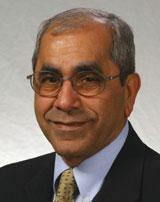Bhudatt Paliwal
Professor
“Medical Physics, as we know it, is well grounded to provide much needed support to the medical profession. Its future can only be brighter.”
Family?
Married, two children, and four grandchildren.
What book is on your nightstand?
“Life Divine,” the same book that my father read many years ago which influenced him to quit the freedom fighter movement with Gandhi.
What is your favorite vice?
I don’t believe in guilt or vices. I believe in promoting happiness and doing things to make people laugh.
Hobbies/downtime activities?
My work is my hobby.
Little known fact?
I am the most confused person in the world, because there are far too many questions to ever know all of the answers.
What superhero power would you want to have?
I wouldn’t want to have a superhero power. To have powers greater than human is what God is.
In the Spotlight
In 1973, Dr. Paliwal was recruited to the University of Wisconsin in Madison by Dr. John Cameron, founder of The Medical Physics Department at UW-Madison. He rose through the academic ranks and is currently a tenured Professor of Human Oncology and Medical Physics. Dr. Paliwal has served as a leader for Radiation Oncology Physics at the University of Wisconsin for 40 years and has mentored hundreds of medical physicists, residents and students from around the world.
What is your position in the department? What do you do?
I am a teaching professor and have been in the field for forty years. I also provide administrative and clinical support. I have done some research too, mainly working with radiation therapy.
What attracted you to the field of medical physics?
At the time that I entered the field, it was the age of cutting edge atomic research. The field was brand new, and I took a course exploring the potential peaceful uses for atomic energy. It was very interesting and I continued to study in the field from that point on.
What are the challenges of working in medical physics? What can students learn from these challenges?
All professions are endeavors in need of constant repair. So, the challenges to improve on and understand the science of radiation therapy and diagnostic imaging are daily tasks. Advances require imagination and exploration along with the new explosive fields of genetics, molecular and cellular biology.
What advice would you give to students? Is there any advice that you received in school or in your career that you would like to share?
Students can continue to try. Do, learn, and gain insight from those experiences.
What can students learn from these challenges?
There’s always something to do. It’s just a matter of whether or not you’re willing to do it. Are you willing to put in the time and effort?
What other career could you see yourself in?
I have always believed academia sows the seeds for which the industry provides the soil for growth. I often thought of being a facilitator of this process.
What do you think is the future of Medical Physics?
Medical Physics, as we know it, is well grounded to provide much needed support to the medical profession. It has evolved considerably over last fifty years and will continue to make further advances. Its future can only be brighter.
